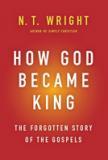Way of Forgiving
Pope John Paul II, in his apostolic letter Rosarium Virginis Mariae (2002), proposed the addition of five Luminous Mysteries to advance “a revival of the Rosary...as a true doorway to the depths of the Heart of Christ” by filling a biblical-Christological gap within the traditional contemplation of scenes only from the Gospel stories of the incarnation, passion and glorification. Given the popular piety and art that dominate Catholicism to this day, one might think of that gap—the complete absence of Jesus’ public ministry—as the unfortunate heritage of a medieval Christianity focused on nativity and crucifixion (think crèche scenes and stations of the cross or high art portrayals of Christ as the babe in his mother’s arms and the man hanging on the cross at Golgotha).
The Evangelical-Anglican biblical historian N. T. Wright, however, dates Christianity’s loss of the true depth of the Gospel’s message from at least the fourth century, as evidenced in the Nicene Creed’s single bound from “born of the Virgin Mary” to “suffered under Pontius Pilate.” Two-thirds of the way through his book, having diagnosed the historical-theological problem and marshaled Old and New Testament sources to assert the genuine contours of what God has done in Christ, Wright reiterates his thesis with verve: “It is all too possible to ‘believe in the divinity of Jesus’ and to couple this with an escapist view of salvation (‘Jesus is God and came to snatch us away from this world’) in a way that may preserve an outward form of ‘Christian orthodoxy,’ but that has left out the heart of the matter.” The heart of the New Testament, Wright repeatedly insists, is likewise the heart of the Old Testament pulsing throughout the Gospel accounts of Jesus’ entire mission.
The Gospel message, Wright argues, was framed in terms not of the Greek-philosophical body and soul but of the Jewish-biblical kingdom and cross, whereby God finally returns to an ever-exiled Israel so that Israel might realize its vocation in the world. “The call of Abraham is the answer to the sin of Adam. Israel’s story is thus the microcosm and beating heart of the world’s story, but also its ultimate saving energy.” What the earliest believers in Jesus came to realize through reflection on his life and death, in light of the Psalms and prophets, was that God’s response to Israel’s ongoing failure to recognize their role as the people through whom God would “deal with the problem of evil” was to “become Israel-in-person.” God in Jesus drew evil “onto one place, allowing it to do its worst at that point.”
Christ’s terrible execution reveals God’s way of reigning in the world. We can, however, only rightly perceive the divine activity therein and its empowerment of believers to do likewise by attending to Jesus’ entire public career as “launching that project,” as the revelation of Israel’s God coming in sovereign power.
The argument, then, rests fully on the paradoxical character of the Gospel. Wright entitled one of his earlier historical-exegetical tomes, Jesus and the Victory of God. Wright’s erstwhile sparring partner, John Dominic Crossan, in turn, entitled his review in a major biblical journal “What Victory? What God?” Crossan, given his quest to reconstruct Jesus as an anticolonial revolutionary, found that Wright’s interpretation leaves Jesus and his God devoid of any real historical consequence. In his latest book Wright is sticking to his guns: “Without the cross, the satanic rule remains in place. … The point of the resurrection is that it is the immediate result of the fact that the victory has already been won. Sin has been dealt with. The ‘accuser’ has nothing more to say. The creator can now launch his new creation.”
But has the matter of sin been so simply settled? How can one assert this when the evidence of sorrow and unjust suffering relentlessly perdures? Wright acknowledges the paradox in insisting that although the first believers “hadn’t been expecting it to work out like this … they would have had no difficulty in recognizing that this was the story that was being told.” The task for Christians today, and the burden of Wright’s entire book, is to retune our ears so as to adequately hear (again) the Evangelists’ story of Jesus as the story of Israel’s God launching a people renewed for an ongoing clash of kingdoms. The soteriological implications are, he pleads, urgent. Old atonement theologies are bankrupt.
Christians must adopt Wright’s reading of kingdom and cross as a call to Scripture’s true political theology: “The Gospels are there, waiting to inform a new generation for holistic mission, to embody, explain, and advocate new ways of ordering communities, nations, and the world.” It is a call to suffer for speaking truth to power. As this reviewer understands it, this is what Wright finally means by God becoming king.
This article also appeared in print, under the headline “Way of Forgiving,” in the September 10, 2012, issue.








